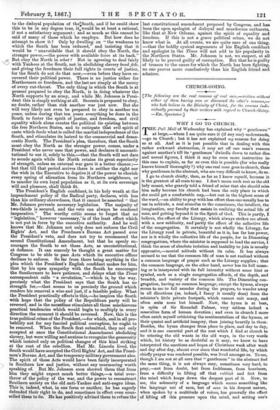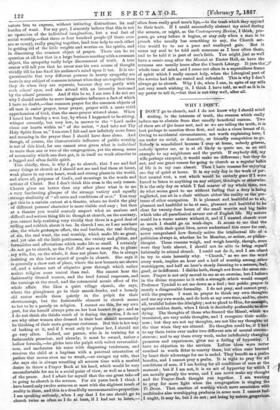CHURCH-GOING.
[The following are the real reasons of real men,—written without either of them having seen or discussed the other's reasons,— who both believe in the Divinity of Christ, for the courses indi- vidually pursued by their writers with regard to Church-Going. —En. Spectator.]
WHY I GO TO CHURCH.
THE Pall Mall of Wednesday has explained why " gentlemen'r at large,--whom I am quite sure it (if any one) understands, —go to Church ; but it has not explained my reasons for doing so at all. And as it is just possible that in dealing with this rather awkward abstraction, it may set off one man's reasons against another's till its ' gentlemen' dwindle down to rather dim. and unreal figures, I think it may be even more instructive in' this case to explain, as far as even this is possible (for who really knows himself thoroughly ?) why one real man goes to church, than• why gentlemen in the abstract, who are very difficult to know, do so. I go to church chiefly, 'then, as far as I know myself, because it is the greatest of all rests td me. I don't mean such rest as the old
lady meant, who gravely told a friend of mine that she should miss him sadly because his church had been the only place in which she could get a comfortable nap,—but rest in the highest sense of the word,—an ability to pray with less effort than one usually has to use in solitude, a real stimulus to the conscience, the intellect, the imagination, any faculty that assists in realizing the actual life of
man, and getting beyond it to the Spirit of God. This is partly, I believe, the effect of the Liturgy, which always strikes me afresh with a new sublimity, and partly the effect of the collective life of the congregation. It certainly is not wholly the Liturgy, for the Liturgy read in private, beautiful as it is, has far less power, nor is it wholly the collective life of the people, for in Dissenting congregations, where the minister is supposed to lead the service, I. think the sense of absolute isolation and inability to join is usually oppressive,—mental solitude without its calm. It has always- seemed to me that the common life. of man is not realized without a common language of prayer such as the Liturgy supplies ; that
the common language, on the other band, never has its fill mean- ing or is interpreted with its full intensity without some hint or symbol, such as a single congregation affords, of the depth, and breadth, and variety of the common life. The Dissenting con-
gregation, having no common language, except the hymns, always seems to me to fall asunder during the prayers, to wander away in all directions (as, indeed, I fancy it usually does) from the minister's little private footpath, which cannot suit many, and often suits none but himself. Now, the hymn is at best, in spite of Sir Roundell Palmer, very seldom indeed a- masculine form of human devotion ; and even in church I more often catch myself criticizing the sentimentalism of the hymns, or their quaint and artificial imagery, than joining heartily in them.
Besides, the hymn changes from place to place, and day to day, and it is one essential part of the rest which I find at church to
be uttering the old wants in the old ways, in the very words which, let history be as doubtful as it may, we know to have interpreted the emotions and hopes of Christians week after week and day after day, almost ever since that wonderful life, by which chiefly prayer was rendered possible, was lived amongst us. To me, though I am not at all sure that " gentlemen" in the abstract feel the same thing, it is not always easy, sometimes very hard, to
pray,--not from doubt, but from feebleness, from heaviness, from a difficulty in lifting off that rubbish and fret from the mind which keeps down the deepest part of it. Now, to me, the solemnity of a language which seems something like the language not of men, but of man in his deepest nature, when spoken by a multitude of voices, has generally the effect of lifting off this pressure upon the mind, and setting one's
nature free to express, without irritating distractions, its real burden of want. For my part, I sincerely believe that this is not an operation of the individual imagination, but a real fact of social worship,—that three or four hundred people (if there ever are as many), really praying together, lend true help to each other in getting rid of the little weights and worries on the spirits, and in discerning the common object of prayer. There can be no question at all but that in a large business meeting with a common object, the sympathy really helps discernment of truth. A true orator will tell you that he never sees his own course of thought vividly till he has fixed his audience's mind upon it too. It is un- questionable that very different persons in hearty sympathy see more in any subject of common interest when they are together than they do when they are separate, because they see partly with each others' eyes, and also attend with an intensity increased by the others' presence. And if this be so, I am sure I do not see why I should ascribe to mere imaginative influence a fact of which I have no doubt,—that common prayer for the common objects of all men is easier prayer, truer prayer, prayer with a more vivid apprehension of God, than the same prayer uttered alone. When I heard last Sunday a wee boy, by whom I happened to be sitting, whisper earnestly, but very low, in answer to the " Lord make clean our hearts within us " of the rector, " And take not Thy Holy Spirit from us," I am sure I felt and saw infinitely more force and meaning in the prayer than I should have done alone. And though, of coarse, the characteristic influence of public worship is not of this kind, for one cannot even guess what is individual to more than one or two of the congregation, yet the strong. sense of community which one does get, is iu itself no weak stimulus to a fagged and often feeble spirit.
This chiefly, then, is why I go to church, that I see and LA many things at church as I should not see and feel them at home, weak places in my own heart, weak and strong places in the world, and above all, purposes of God's, and meanings in the words and actions of Christ. But I don't think this even is the only reason. Church gives me better than any other place what is to me , a very fascinating glimpse of the strange variety and equally strange similarity of " all sorts and conditions of men." You may get this to a certain extent at a theatre, where no doubt the play of different persons' character is more visible and easy ; but then at a theatre you would scarcely suspect what an anxious and difficult and serious thing life is; though at church, on the contrary, you cannot help realizing very vividly that there is a good deal of . trifling and rubbish about it too. In church I see, as I see nowhere . else, the whole grotesque effect, the real burdens, the real- feeling of sin, the real want, the real worship, which make life so great, and yet also all the little pettinesses, the variety and glitter, and formalities and affectations which make life so small. I certainly do not go to church, as the Pall Mall says so many do, to please my wife, for, on the whole, it does not please her. She is always • insisting on this latter aspect of people in church. She says it is generally a show sort of place, where the new bonnets are shown off, and a solemn sort of etiquette gone through which rather makes religion more unreal than real. She cannot bear the fashionably dressed women, and the loud formal responses, and the turnings at the creed, and the ceremonial scenic effect of the whole affair. She likes a quiet village church, she says, where the ploughmen go in their smock-frocks, and a homely old rector scolds them quietly in the pulpit for their shortcomings, but the fashionable element in church seems to her to be a parody on religion. I cannot see this, for my own part, for she herself always puts on her best bonnet to go ; and as I do not think she thinks much of it during the service, I do not see why other women also dressed in their best should necessarily be thinking of their more gorgeous costumes. But this is her way of looking at it, and if I went only to please her, I should not go very often. Indeed, our parson, who is in training for a fashionable preacher, and already, it must be owned, rather a hollow formula,—he glides into the ptilpit with velvet reverential- fleas, and moderates his voice with disgusting tenderness, and receives the child at a baptism with a paternal ostentation of pathos that moves even me to wrath,—so enrages my wife, that she says she is always wrestling all sermon time with a morbid desire to throw a Prayer Book at his head, which would be very uncomfortable for me in a social point of view, as well as a breach of the peace. And I admit for myself that the one great take-off in going to church is the sermon. For six years back I think I have heard only twelve sermons at most with the slightest touch of reality in them, and this is a dreadfully unremunerative proportion. I am speaking seriously, when I say that I for one should go to church twice as often as I do at least, if I had not to listen,— often from really good men's lips,—to the trash which they append to their texts. If I could successfully abstract my mind during the sermon, or might, as the Contemporary Review, I think, pro- poses, go away before it begins, or stay only when a man is to preach who usually has something to say, the Church ser- vice would be to me a pure and unalloyed gain. But it vexes my soul to be told such nonsense as I hear often there, and to be told it is part of one's faith. You might just as well have a comic song after the Messiah at Exeter Hall, as have the sermons one usually hears after the Church Liturgy. It jars theLj whole tone of mind, and I come out often in a supercilious frame of spirit which I really cannot help, when the Liturgical part of the service had left me rested and refreshed. This is why I don't always go to church. Why I do, when I can, in spite of my wife not very much wishing it, I think I have told, as well as it is in my power to tell it,—but that is not very well, after all.



































 Previous page
Previous page